Enhanced Rock Weathering Conference (ERW25)
June 3 – 5 2025, Antwerp
We invite you to ERW25, the third annual Enhanced Rock Weathering Conference, which wil bring together voices and perspectives from across the field. ERW25 focusses on the potential and the barriers to the implementation of Enhanced Rock Weathering (ERW) as a tool to address the climate challenge. Through a series of sessions, we examined the latest research, technologies, and policy frameworks that underpin enhanced weathering practices in terrestrial and marine environments. Researchers, academics, market stakeholders, and others will share their insights and contribute to the advancement of ERW science and industry.
Abstract submission: December 15 – March 15
Registration: March 15 – May 15
All information: https://www.uantwerpen.be/erw25
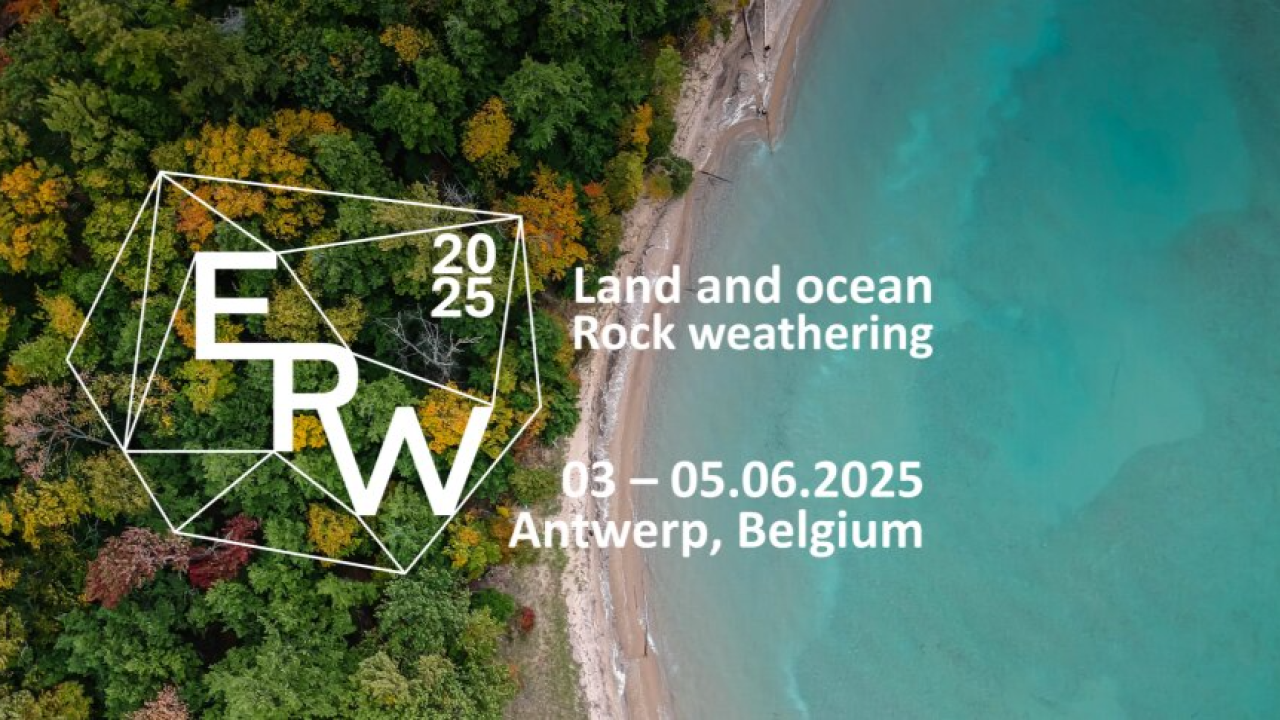
Innovation
The need for negative emission technologies (NETs): Conventional climate change mitigation alone will not be able to stabilise atmospheric CO2 concentrations at a level compatible with the 2°C warming limit of the Paris Agreement. Safe and scalable NETs, which remove CO2 from the atmosphere and ensure long-term carbon sequestration, are needed to meet this goal. Fast progress is needed, especially if NETs are to serve as a risk-hedging mechanism for unexpected geopolitical events and for the transgression of tipping points in the Earth system.
BAM! centers on combining the weathering power of prokaryotes, plants, fungi and invertebrates in a multiphase hybrid reactor, setting an entirely new trajectory for enhanced weathering research. We install an unprecedented set-up of treatment combinations and high-frequency assessments of abiotic (pH, temperature, weathering rates,…) and biotic conditions (earthworm activity, bacterial and fungal metabolism, fungal growth, …). An AI-based machine learning analysis module is used to rapidly identify which conditions favor weathering rates and carbon sequestration.
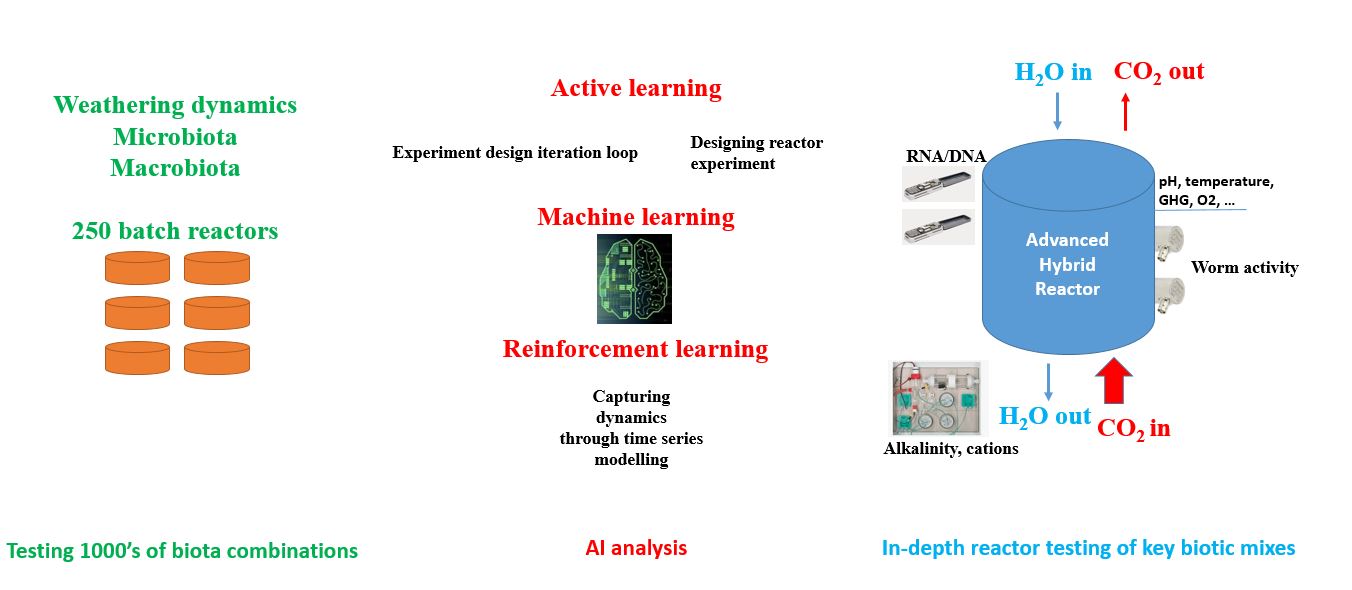
Future Markets
Apart from being a potential game-changer for CO2 removal, BAM! aims to make a difference through its potential for embedment in a larger CO2-negative and sustainable agriculture/industry framework. The reactive mineral-organic-worm cast mixture in the BAM! reactor can potentially be transformed into a natural fertilizer. To align with metal and steel industry, silicates might be replaced with silicate steel slag waste from the industry itself. Implementation in harbour areas provides potential for the implementation of management strategies to improve coastal resilience against ocean acidification (alkalinity) and eutrophication (increased silicate availability).
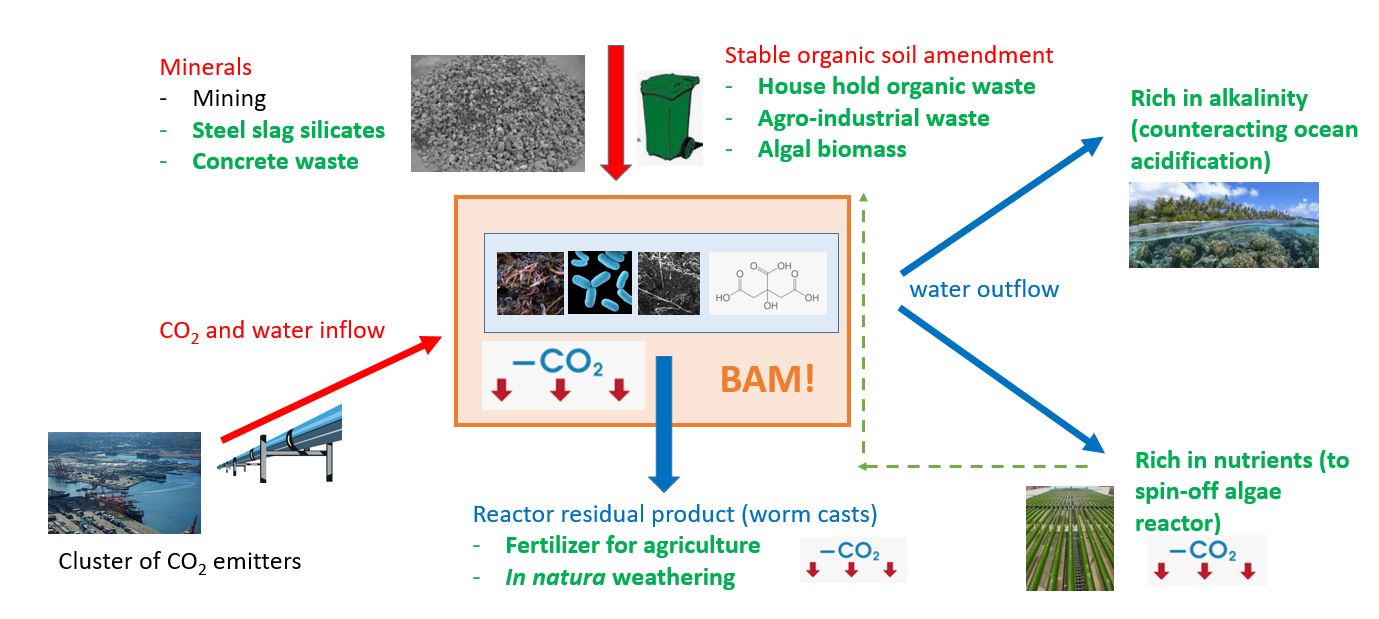
Publications
- Vicca, S., Goll, D. S., Hagens, M., Hartmann, J., Janssens, I. A., Neubeck, A., Peñuelas, J., Poblador, S., Rijnders, J., Sardans, J., Struyf, E., Swoboda, P., van Groenigen, J. W., Vienne, A., & Verbruggen, E. (2022). Is the climate change mitigation effect of enhanced silicate weathering governed by biological processes? Global Change Biology, 28, 711–726. https://ddd.uab.cat/record/257153
- Janssens IA., Roobroeck D, Sardans J, Obersteiner M, Peñuelas J, Richter A, Smith P, Verbruggen E, Vicca S. (2022). Negative erosion and negative emissions: Combining multiple land-based carbon dioxide removal techniques to rebuild fertile topsoils and enhance food production Frontiers in Climate, 4. https://doi.org/10.3389/fclim.2022.928403
- Calogiuri T, Hagens M, Van Groenigen JW, Corbett T, Hartmann J, Hendriksen R, Janssens I, Janssens IA, Ledesma Dominguez G, Loescher G, Mortier S, Neubeck A, Niron H, Poetra RP, Rieder L, Struyf E, Van Tendeloo M, De Schepper T, Verdonck T, Vlaeminck SE, Vicca S, Vidal A. (2023). Design and construction of an experimental setup to enhance mineral weathering through the activity of soil organisms. J Vis Exp. 10;(201). https://doi.org/10.3791/65563
- Mathilde Hagens, Jens Hartmann, Sara Vicca and David J. Beerling. Editorial: Enhanced weathering and synergistic combinations with other CDR methods. (2023). Frontiers in Climate. https://doi.org/10.3389/fclim.2023.1244396
- Rieder, Lukas; Amann, Thorben; Hartmann, Jens. Soil electrical conductivity as a proxy for enhanced weathering in soils. Frontiers in Climate (2024), 5. https://www.frontiersin.org/articles/10.3389/fclim.2023.1283107.
- Thomas Corbett, Marcus Westholm, Anna Rosling, Tullia Calogiuri, Reinaldy Poetra, Harun Niron, Mathilde Hagens, Alix Vidal, Jan Willem Van Groenigen, Jens Hartmann, Ivan Janssens, Lukas Rieder, Eric Struyf, Michiel Van Tendeloo, Siegfried Vlaeminck, Sara Vicca, Anna Neubeck. Organic carbon source controlled microbial olivine dissolution in small-scale flow-through bioreactors, for CO2removal. (2024). npj Materials Degradation. https://doi.org/10.1038/s41529-024-00454-w
- Harun Niron, Arthur Vienne, Patrick Frings, Reinaldy Poetra, Sara Vicca. Exploring the synergy of enhanced weathering and Bacillus subtilis: A promising strategy for sustainable agriculture. (2024). Global Change Biology. https://repository.uantwerpen.be/docman/irua/123f7fmotoMab
- Tullia Calogiuri, Iris Janssens, Alix Vidal, Jan Willem Van Groenigen, Tim Verdonck, Thomas Corbett, Jens Hartmann, Anna Neubeck, Harun Niron, Reinaldy P. Poetra, Lukas Rieder, Thomas Servotte, Abhijeet Singh, Michiel Van Tendeloo, Siegfried E. Vlaeminck, Sara Vicca, Mathilde Hagens. How earthworms thrive and drive silicate rock weathering in an artificial organo-mineral system. (2025) Applied Geochemistry. https://doi.org/10.1016/j.apgeochem.2024.106271
- Corbett Thomas, Odelius Elisabeth, Uebel Tora, Jonsson Tove, Singh Abhijeet, Vicca Sara, Hagens Mathilde, Budnyak Tetyana, Tkachenko Oleg, Poetra Reinaldy, Hartmann Jens, Janssens Ivan A., Niron Harun, Van Tendeloo Michiel, Vlaeminck Siegfried E., Neubeck Anna. Microbial dissolution of Gran Canaria lapilli in small-scale flow through columns: carbon dioxide removal potential (2025) npj Materials Degradation. https://doi.org/10.1038/s41529-025-00611-9
- Nick Van Hee, Michiel Van Tendeloo, Konstantina Vasilakou, Harun Niron, Eric Struyf, Jens Hartmann, Sara Vicca, Philippe Nimmegeers, Siegfried E. Vlaeminck. Economic feasibility of a novel bio-accelerated silicate weathering reactor concept for climate change mitigation. (2025) International Journal of Greenhouse Gas Control. https://hdl.handle.net/10067/2147330151162165141
- Péter Garamszegi, Tullia Calogiuri, Mathilde Hagens, Alix Vidal, Jan Willem Van Groenigen. A density-based method to objectively quantify earthworm activity. (2025) Applied Soil Ecology. https://doi.org/10.1016/j.apsoil.2024.105771.
- Iris Janssens, Thomas Servotte, Tullia Calogiuri, Steven Mortier, Harun Niron, Thomas Corbett, Reinaldy P. Poetra, Lukas Rieder, Michiel Van Tendeloo, Abhijeet Singh, Steven Latré, Siegfried E. Vlaminck, Jens Hartmann, JanWillem van Groenigen, AnnaNeubeck, Alix Vidal, Ivan A. Janssens, Mathilde Hagens, Sara Vicca, and Tim Verdonck, Machine learning-based identification of key biotic and abiotic drivers of mineral weathering rate in a complex enhanced weathering experiment. (2025) Open Res Europe, 5:71 https://doi.org/10.12688/openreseurope.19252.3.
- Harun Niron, Tullia Calogiuri, Abhijeet Singh, Anna Neubeck, Michiel Van Tendeloo, Tom Cox, Jens Hartmann, Siegfried E. Vlaeminck, Sara Vicca. Alkalinity production and carbon capture from dunite weathering: Individual effects of oxalate, citrate, and EDTA salts. (2025) Chemical Engineering Journal Advances. https://doi.org/10.1016/j.ceja.2025.100902.
Master Theses
- Péter Garamszegi (WU): Can endogeic earthworms contribute to enhanced weathering in a bioreactor?. Completed on March 8, 2022
- Aram Van Cauwenberghe (Master environmental science, UAntwerpen): Bio-enhanced silicate weathering: Designing a conceptual multiphase reactor (2022)
- Ezra Remes (Master environmental science, UAntwerpen): Bio-accelerated mineral weathering in a reactor: Identifying a feasible mineral bed and mixing methodology (2022)
- Giovanni Galeasso (UHAM) – Dissolved organic carbon leaching in a column experiment on Enhanced Weathering combining basalt and biochar additions (2022)
- Lukas Rieder (UHAM) – Using conductivity to monitor CO2 capture by enhanced weathering (2022)
- Kenneth Otte (UHH) – Weathering rates of dunite and basalt under the influence of mechanical stirring (2022)
- Kangying Xie (WU) – Investigating the influence of earthworms in increasing silicate weathering rate and reducing heavy metal release from minerals (2023)
- Marcus Westholm (UU) – Bio-enhanced silicate weathering – Coupled to sequestration of CO2 (2022)
- Elisabeth Odelius & Tora Uebel (UU) – CO2 Sequestration by Bio-Accelerated Silicate Weathering (2023)
- Arunava Poddar (UU) – Impact of sterilization on the absolute and relative weathering bio-enhanced rate of basalts (2024)
- Kaja Czub (UA) – Bio-Accelerated Mineral Weathering for CO2 Sequestration: construction and validation of a down-scaled prototype reactor (2024)
- Elisabeth Odelius (UU) – Enhanced Weathering of Basalt: Effects of fungal inoculation, citric acid and carbonation (2025)
- Lorenzo Djokarijo (WU) – What is the role of earthworm casts containing basaltic rock on plant growth, soil microbial communities and rock weathering? (2025)
- Tove Jonsson (UU) – Nitrogen supplementation to support microbial silicate weathering in small-scale flow-through columns (2025).
- Megan Tijssens (UA) – Advancing low-energy carbon capture with enhanced steel slag weathering (2025)
- Brent Moens (UA) – Capture potential of enhanced steel slag weathering under realistic application conditions (2025)
- Ina Nipper (UHAM) – Influence of CO2 gas input and stirring on carbon sequestration potential of a steel slag slurry (2025)
Partnership
The BIO: The Global Change Ecology Excellence Centre (GCE) at UAntwerpen has key expertise on biogeochemical carbon cycling. It performed one of the first ESW in natura experimental quantifications, showing strong constraints for ESW under soil conditions. This knowledge is complemented by the Soil Biology and Soil Chemistry research groups at WU, with key expertise on the functioning of invertebrates, and the catalysing role earthworms play in biogeochemical processes. Bio-expertise is completed by UU, specializing in siderophores as ‘tools’ for dissolving crystalline material, and in the properties of the micro-organisms that create them.
The GEO: The Institute for Geology of UHAM has key knowledge on techniques to assess weathering processes. The group of Jens Hartmann is world-leading in research on chemical weathering in the Earth System at various scales, with a specific focus on CO2 removal methods.
The Engineering: Bio-reactor development will be coordinated by the Microbial Cleantech (MCt) research group of UAntwerpen, which has core expertise regarding the development, smart design and operation of hybrid and bioreactors. The group’s methodology spans from lab- to full-scale reactors and from microbial analyses to process control and microbiome management.
The Data: The data scientists at IMEC IDLab are internationally recognized for their machine learning insights and capabilities. They are ideally placed to tackle BAM!’s complex data challenges, through their specialization in automated machine learning solutions, sensor development and connection.
Coordinator

Prof. Sara Vicca
Prof. Ivan Janssens
Dr. Harun Niron
Dr. Tom Cox
Dr. Joke Van den Berge
Past collaborator
Guillermo Ledesma
Partnership

Prof. Tim Verdonck
Iris Janssens
Thomas Servotte
Past collaborator
Prof. Steven Latré
Steven Mortier
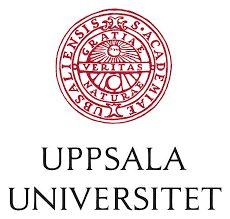
Dr. Anna Neubeck
Dr. Abhijeet Singh
Past collaborator
Prof. Anna Rosling
Dr. Thomas Corbett

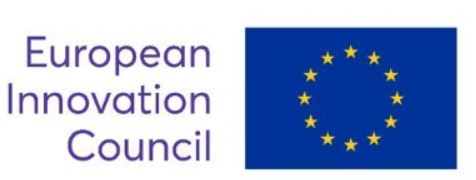
The BAM! EIC Pathfinder project has received funding from the European Union’s Horizon 2020 framework programme for research and innovation under grant agreement No 964545.


